"What I am really concerned with is giving you some insight into the relationship of a book collector to his possessions, into collecting rather than a collection. If I do this by elaborating on the various ways of acquiring books, this is something entirely arbitrary. This or any other procedure is merely a dam against the spring tide of memories which surges toward any collector as he contemplates his possessions. Every passion borders on the chaotic, but the collector's passion borders on the chaos of memories. More than that: the chance, the fate, that suffuse the past before my eyes are conspicuously present in the accustomed confusion of these books. For what else is this collection but a disorder to which habit has accommodated itself to such an extent that it can appear as order? You have all heard of people whom the loss of their books has turned into invalids, or of those who in order to acquire them became criminals. These are the very areas in which any order is a balancing act of extreme precariousness. "The only exact knowledge there is," said Anatole France, "is the knowledge of the date of publication and the format of books." And indeed, if there is a counterpart to the confusion of a library, it is the order of its catalogue.
Thus there is in the life of a collector a dialectical tension between the poles of disorder and order.
Naturally, his existence is tied to many other things as well: to a very mysterious relationship to ownership, something about which we shall have more to say later; also, to a relationship to objects which does not emphasize their functional, utilitarian value—that is, their usefulness—but studies and loves them as the scene, the stage, of their fate. The most profound enchantment for the collector is the locking of individual items within a magic circle in which they are fixed as the final thrill, the thrill of acquisition, passes over them. Everything remembered and thought, everything conscious, becomes the pedestal, the frame, the base, the lock of his property. The period, the region, the craftsmanship, the former ownership—for a true collector the whole background of an item adds up to a magic encyclopedia whose quintessence is the fate of his object. In this circumscribed area, then, it may be surmised how the great physiognomists—and collectors are the physiognomists of the world of objects—turn into interpreters of fate. One has only to watch a collector handle the objects in his glass case. As he holds them in his hands, he seems to be seeing through them into their distant past as though inspired. So much for the magical side of the collector—his old-age image, I might call it."
Excerpts from Walter Benjamin, Unpacking my library (1931)
in Illuminations
Translated by Harry Zohn
Schoken Books, 1969
- X
- Tumblr
-
![Juan Araujo Hoje é sempre ontem, 2022 óleo sobre lâmina de zinco [oil on zinc plate] 20 x 15 cm | 7 7/8 x 5 7/8 in Ph: Edouard Fraipont](data:image/gif;base64,R0lGODlhAQABAIAAAAAAAP///yH5BAEAAAAALAAAAAABAAEAAAIBRAA7) Juan AraujoHoje é sempre ontem, 2022óleo sobre lâmina de zinco
Juan AraujoHoje é sempre ontem, 2022óleo sobre lâmina de zinco
[oil on zinc plate]20 x 15 cm | 7 7/8 x 5 7/8 inPh: Edouard Fraipont%3Cdiv%20class%3D%22artist%22%3E%3Cstrong%3EJuan%20Araujo%3C/strong%3E%3C/div%3E%3Cdiv%20class%3D%22title%22%3E%3Cem%3EHoje%20%26%23233%3B%20sempre%20ontem%3C/em%3E%3Cspan%20class%3D%22comma%22%3E%2C%20%3C/span%3E2022%3C/div%3E%3Cdiv%20class%3D%22medium%22%3E%26%23243%3Bleo%20sobre%20l%26%23226%3Bmina%20de%20zinco%3Cbr%20/%3E%5Boil%20on%20zinc%20plate%5D%3C/div%3E%3Cdiv%20class%3D%22dimensions%22%3E20%20x%2015%20cm%20%7C%207%207/8%20x%205%207/8%20in%3C/div%3E%3Cdiv%20class%3D%22dimensions%22%3EPh%3A%20Edouard%20Fraipont%3C/div%3E -

-
![Jake and Dinos Chapman Portrait of Luisa Strina, 2006 óleo sobre tela [oil on canvas] 61 x 45.5 cm Ph: Edoaurd Fraipont](data:image/gif;base64,R0lGODlhAQABAIAAAAAAAP///yH5BAEAAAAALAAAAAABAAEAAAIBRAA7) Jake and Dinos ChapmanPortrait of Luisa Strina, 2006óleo sobre tela [oil on canvas]61 x 45.5 cmPh: Edoaurd Fraipont%3Cdiv%20class%3D%22artist%22%3E%3Cstrong%3EJake%20and%20Dinos%20Chapman%3C/strong%3E%3C/div%3E%3Cdiv%20class%3D%22title%22%3E%3Cem%3EPortrait%20of%20Luisa%20Strina%3C/em%3E%3Cspan%20class%3D%22comma%22%3E%2C%20%3C/span%3E2006%3C/div%3E%3Cdiv%20class%3D%22medium%22%3E%26%23243%3Bleo%20sobre%20tela%20%5Boil%20on%20canvas%5D%3C/div%3E%3Cdiv%20class%3D%22dimensions%22%3E61%20x%2045.5%20cm%3C/div%3E%3Cdiv%20class%3D%22dimensions%22%3EPh%3A%20Edoaurd%20Fraipont%3C/div%3E
Jake and Dinos ChapmanPortrait of Luisa Strina, 2006óleo sobre tela [oil on canvas]61 x 45.5 cmPh: Edoaurd Fraipont%3Cdiv%20class%3D%22artist%22%3E%3Cstrong%3EJake%20and%20Dinos%20Chapman%3C/strong%3E%3C/div%3E%3Cdiv%20class%3D%22title%22%3E%3Cem%3EPortrait%20of%20Luisa%20Strina%3C/em%3E%3Cspan%20class%3D%22comma%22%3E%2C%20%3C/span%3E2006%3C/div%3E%3Cdiv%20class%3D%22medium%22%3E%26%23243%3Bleo%20sobre%20tela%20%5Boil%20on%20canvas%5D%3C/div%3E%3Cdiv%20class%3D%22dimensions%22%3E61%20x%2045.5%20cm%3C/div%3E%3Cdiv%20class%3D%22dimensions%22%3EPh%3A%20Edoaurd%20Fraipont%3C/div%3E -

-
![Francis Alÿs Sem título [Untitled], 1993-1994 em colaboração com Emilio Rivera óleo sobre tela [oil on canvas] 62.5 x 72 cm | 20 x 22 cm Ph: Edouard Fraipont](data:image/gif;base64,R0lGODlhAQABAIAAAAAAAP///yH5BAEAAAAALAAAAAABAAEAAAIBRAA7) Francis AlÿsSem título [Untitled], 1993-1994em colaboração com Emilio Riveraóleo sobre tela [oil on canvas]62.5 x 72 cm | 20 x 22 cmPh: Edouard Fraipont%3Cdiv%20class%3D%22artist%22%3E%3Cstrong%3EFrancis%20Al%26%23255%3Bs%3C/strong%3E%3C/div%3E%3Cdiv%20class%3D%22title%22%3E%3Cem%3ESem%20t%26%23237%3Btulo%20%5BUntitled%5D%3C/em%3E%3Cspan%20class%3D%22comma%22%3E%2C%20%3C/span%3E1993-1994%3C/div%3E%3Cdiv%20class%3D%22signed_and_dated%22%3Eem%20colabora%26%23231%3B%26%23227%3Bo%20com%20Emilio%20Rivera%3C/div%3E%3Cdiv%20class%3D%22medium%22%3E%26%23243%3Bleo%20sobre%20tela%20%5Boil%20on%20canvas%5D%3C/div%3E%3Cdiv%20class%3D%22dimensions%22%3E62.5%20x%2072%20cm%20%7C%2020%20x%2022%20cm%3C/div%3E%3Cdiv%20class%3D%22dimensions%22%3EPh%3A%20Edouard%20Fraipont%3C/div%3E
Francis AlÿsSem título [Untitled], 1993-1994em colaboração com Emilio Riveraóleo sobre tela [oil on canvas]62.5 x 72 cm | 20 x 22 cmPh: Edouard Fraipont%3Cdiv%20class%3D%22artist%22%3E%3Cstrong%3EFrancis%20Al%26%23255%3Bs%3C/strong%3E%3C/div%3E%3Cdiv%20class%3D%22title%22%3E%3Cem%3ESem%20t%26%23237%3Btulo%20%5BUntitled%5D%3C/em%3E%3Cspan%20class%3D%22comma%22%3E%2C%20%3C/span%3E1993-1994%3C/div%3E%3Cdiv%20class%3D%22signed_and_dated%22%3Eem%20colabora%26%23231%3B%26%23227%3Bo%20com%20Emilio%20Rivera%3C/div%3E%3Cdiv%20class%3D%22medium%22%3E%26%23243%3Bleo%20sobre%20tela%20%5Boil%20on%20canvas%5D%3C/div%3E%3Cdiv%20class%3D%22dimensions%22%3E62.5%20x%2072%20cm%20%7C%2020%20x%2022%20cm%3C/div%3E%3Cdiv%20class%3D%22dimensions%22%3EPh%3A%20Edouard%20Fraipont%3C/div%3E -
![Geta Brătescu Vestigii, 1978 colagem têxtil sobre papel [textile collage on paper] 37 x 52 cm Ph: Edouard Fraipont](data:image/gif;base64,R0lGODlhAQABAIAAAAAAAP///yH5BAEAAAAALAAAAAABAAEAAAIBRAA7) Geta BrătescuVestigii, 1978colagem têxtil sobre papel [textile collage on paper]37 x 52 cmPh: Edouard Fraipont%3Cdiv%20class%3D%22artist%22%3E%3Cstrong%3EGeta%20Br%26%23259%3Btescu%3C/strong%3E%3C/div%3E%3Cdiv%20class%3D%22title%22%3E%3Cem%3EVestigii%3C/em%3E%3Cspan%20class%3D%22comma%22%3E%2C%20%3C/span%3E1978%3C/div%3E%3Cdiv%20class%3D%22medium%22%3Ecolagem%20t%26%23234%3Bxtil%20sobre%20papel%20%5Btextile%20collage%20on%20paper%5D%3C/div%3E%3Cdiv%20class%3D%22dimensions%22%3E37%20x%2052%20cm%3C/div%3E%3Cdiv%20class%3D%22dimensions%22%3EPh%3A%20Edouard%20Fraipont%3C/div%3E
Geta BrătescuVestigii, 1978colagem têxtil sobre papel [textile collage on paper]37 x 52 cmPh: Edouard Fraipont%3Cdiv%20class%3D%22artist%22%3E%3Cstrong%3EGeta%20Br%26%23259%3Btescu%3C/strong%3E%3C/div%3E%3Cdiv%20class%3D%22title%22%3E%3Cem%3EVestigii%3C/em%3E%3Cspan%20class%3D%22comma%22%3E%2C%20%3C/span%3E1978%3C/div%3E%3Cdiv%20class%3D%22medium%22%3Ecolagem%20t%26%23234%3Bxtil%20sobre%20papel%20%5Btextile%20collage%20on%20paper%5D%3C/div%3E%3Cdiv%20class%3D%22dimensions%22%3E37%20x%2052%20cm%3C/div%3E%3Cdiv%20class%3D%22dimensions%22%3EPh%3A%20Edouard%20Fraipont%3C/div%3E -
![Cildo Meireles A Penteadeira, 1967 madeira pintada, espelho [painted wood, mirror] 122 x 95 x 6 cm Ph: Edouard Fraipont](data:image/gif;base64,R0lGODlhAQABAIAAAAAAAP///yH5BAEAAAAALAAAAAABAAEAAAIBRAA7) Cildo MeirelesA Penteadeira, 1967madeira pintada, espelho
Cildo MeirelesA Penteadeira, 1967madeira pintada, espelho
[painted wood, mirror]122 x 95 x 6 cmPh: Edouard Fraipont%3Cdiv%20class%3D%22artist%22%3E%3Cstrong%3ECildo%20Meireles%3C/strong%3E%3C/div%3E%3Cdiv%20class%3D%22title%22%3E%3Cem%3EA%20Penteadeira%3C/em%3E%3Cspan%20class%3D%22comma%22%3E%2C%20%3C/span%3E1967%3C/div%3E%3Cdiv%20class%3D%22medium%22%3Emadeira%20pintada%3Cspan%20class%3D%22comma%22%3E%2C%20%3C/span%3Eespelho%3Cbr%20/%3E%5Bpainted%20wood%3Cspan%20class%3D%22comma%22%3E%2C%20%3C/span%3Emirror%5D%3C/div%3E%3Cdiv%20class%3D%22dimensions%22%3E122%20x%2095%20x%206%20cm%3C/div%3E%3Cdiv%20class%3D%22dimensions%22%3EPh%3A%20Edouard%20Fraipont%3C/div%3E -
![Mike Nelson Cloak of rags (capital/carpet), 2017 gesso, concreto, tijolos, tapetes, pintura azul ultramarina [plaster, concrete, bricks, carpets, ultramarine blue paint] 32 x 85 x 65 cm Ph: Edouard Fraipont](data:image/gif;base64,R0lGODlhAQABAIAAAAAAAP///yH5BAEAAAAALAAAAAABAAEAAAIBRAA7) Mike NelsonCloak of rags (capital/carpet), 2017gesso, concreto, tijolos, tapetes, pintura azul ultramarina [plaster, concrete, bricks, carpets, ultramarine blue paint]32 x 85 x 65 cm
Mike NelsonCloak of rags (capital/carpet), 2017gesso, concreto, tijolos, tapetes, pintura azul ultramarina [plaster, concrete, bricks, carpets, ultramarine blue paint]32 x 85 x 65 cm
Ph: Edouard Fraipont%3Cdiv%20class%3D%22artist%22%3E%3Cstrong%3EMike%20Nelson%3C/strong%3E%3C/div%3E%3Cdiv%20class%3D%22title%22%3E%3Cem%3ECloak%20of%20rags%20%28capital/carpet%29%3C/em%3E%3Cspan%20class%3D%22comma%22%3E%2C%20%3C/span%3E2017%3C/div%3E%3Cdiv%20class%3D%22medium%22%3Egesso%3Cspan%20class%3D%22comma%22%3E%2C%20%3C/span%3Econcreto%3Cspan%20class%3D%22comma%22%3E%2C%20%3C/span%3Etijolos%3Cspan%20class%3D%22comma%22%3E%2C%20%3C/span%3Etapetes%3Cspan%20class%3D%22comma%22%3E%2C%20%3C/span%3Epintura%20azul%20ultramarina%20%5Bplaster%3Cspan%20class%3D%22comma%22%3E%2C%20%3C/span%3Econcrete%3Cspan%20class%3D%22comma%22%3E%2C%20%3C/span%3Ebricks%3Cspan%20class%3D%22comma%22%3E%2C%20%3C/span%3Ecarpets%3Cspan%20class%3D%22comma%22%3E%2C%20%3C/span%3Eultramarine%20blue%20paint%5D%3C/div%3E%3Cdiv%20class%3D%22dimensions%22%3E32%20x%2085%20x%2065%20cm%3Cbr%20/%3EPh%3A%20Edouard%20Fraipont%3C/div%3E -
![Marepe Banca de Veneno, 1996 madeira, ratos e baratas, pacotes de veneno [wood, rats and cockroaches, poison packets] 130 x 81 x 51 cm Ph: Edouard Fraipont](data:image/gif;base64,R0lGODlhAQABAIAAAAAAAP///yH5BAEAAAAALAAAAAABAAEAAAIBRAA7) MarepeBanca de Veneno, 1996madeira, ratos e baratas, pacotes de veneno [wood, rats and cockroaches, poison packets]130 x 81 x 51 cmPh: Edouard Fraipont%3Cdiv%20class%3D%22artist%22%3E%3Cstrong%3EMarepe%3C/strong%3E%3C/div%3E%3Cdiv%20class%3D%22title%22%3E%3Cem%3EBanca%20de%20Veneno%3C/em%3E%3Cspan%20class%3D%22comma%22%3E%2C%20%3C/span%3E1996%3C/div%3E%3Cdiv%20class%3D%22medium%22%3Emadeira%3Cspan%20class%3D%22comma%22%3E%2C%20%3C/span%3Eratos%20e%20baratas%3Cspan%20class%3D%22comma%22%3E%2C%20%3C/span%3Epacotes%20de%20veneno%20%5Bwood%3Cspan%20class%3D%22comma%22%3E%2C%20%3C/span%3Erats%20and%20cockroaches%3Cspan%20class%3D%22comma%22%3E%2C%20%3C/span%3Epoison%20packets%5D%3C/div%3E%3Cdiv%20class%3D%22dimensions%22%3E130%20x%2081%20x%2051%20cm%3C/div%3E%3Cdiv%20class%3D%22dimensions%22%3EPh%3A%20Edouard%20Fraipont%3C/div%3E
MarepeBanca de Veneno, 1996madeira, ratos e baratas, pacotes de veneno [wood, rats and cockroaches, poison packets]130 x 81 x 51 cmPh: Edouard Fraipont%3Cdiv%20class%3D%22artist%22%3E%3Cstrong%3EMarepe%3C/strong%3E%3C/div%3E%3Cdiv%20class%3D%22title%22%3E%3Cem%3EBanca%20de%20Veneno%3C/em%3E%3Cspan%20class%3D%22comma%22%3E%2C%20%3C/span%3E1996%3C/div%3E%3Cdiv%20class%3D%22medium%22%3Emadeira%3Cspan%20class%3D%22comma%22%3E%2C%20%3C/span%3Eratos%20e%20baratas%3Cspan%20class%3D%22comma%22%3E%2C%20%3C/span%3Epacotes%20de%20veneno%20%5Bwood%3Cspan%20class%3D%22comma%22%3E%2C%20%3C/span%3Erats%20and%20cockroaches%3Cspan%20class%3D%22comma%22%3E%2C%20%3C/span%3Epoison%20packets%5D%3C/div%3E%3Cdiv%20class%3D%22dimensions%22%3E130%20x%2081%20x%2051%20cm%3C/div%3E%3Cdiv%20class%3D%22dimensions%22%3EPh%3A%20Edouard%20Fraipont%3C/div%3E -
![Edgard de Souza Sem Título, 1986 concreto e ferro [concrete and iron] 66 x 46 x 31 cm Ph: Edouard Fraipont](data:image/gif;base64,R0lGODlhAQABAIAAAAAAAP///yH5BAEAAAAALAAAAAABAAEAAAIBRAA7) Edgard de SouzaSem Título, 1986concreto e ferro [concrete and iron]66 x 46 x 31 cmPh: Edouard Fraipont%3Cdiv%20class%3D%22artist%22%3E%3Cstrong%3EEdgard%20de%20Souza%3C/strong%3E%3C/div%3E%3Cdiv%20class%3D%22title%22%3E%3Cem%3ESem%20T%26%23237%3Btulo%3C/em%3E%3Cspan%20class%3D%22comma%22%3E%2C%20%3C/span%3E1986%3C/div%3E%3Cdiv%20class%3D%22medium%22%3Econcreto%20e%20ferro%20%5Bconcrete%20and%20iron%5D%3C/div%3E%3Cdiv%20class%3D%22dimensions%22%3E66%20x%2046%20x%2031%20cm%3C/div%3E%3Cdiv%20class%3D%22dimensions%22%3EPh%3A%20Edouard%20Fraipont%3C/div%3E
Edgard de SouzaSem Título, 1986concreto e ferro [concrete and iron]66 x 46 x 31 cmPh: Edouard Fraipont%3Cdiv%20class%3D%22artist%22%3E%3Cstrong%3EEdgard%20de%20Souza%3C/strong%3E%3C/div%3E%3Cdiv%20class%3D%22title%22%3E%3Cem%3ESem%20T%26%23237%3Btulo%3C/em%3E%3Cspan%20class%3D%22comma%22%3E%2C%20%3C/span%3E1986%3C/div%3E%3Cdiv%20class%3D%22medium%22%3Econcreto%20e%20ferro%20%5Bconcrete%20and%20iron%5D%3C/div%3E%3Cdiv%20class%3D%22dimensions%22%3E66%20x%2046%20x%2031%20cm%3C/div%3E%3Cdiv%20class%3D%22dimensions%22%3EPh%3A%20Edouard%20Fraipont%3C/div%3E -
![Ivens Machado Sem título {Untitled], 1990 concreto armado e madeira [reinforced concrete and wood] 88 x 107 x 20 cm Ph: Edouard Fraipont](data:image/gif;base64,R0lGODlhAQABAIAAAAAAAP///yH5BAEAAAAALAAAAAABAAEAAAIBRAA7) Ivens MachadoSem título {Untitled], 1990concreto armado e madeira [reinforced concrete and wood]88 x 107 x 20 cmPh: Edouard Fraipont%3Cdiv%20class%3D%22artist%22%3E%3Cstrong%3EIvens%20Machado%3C/strong%3E%3C/div%3E%3Cdiv%20class%3D%22title%22%3E%3Cem%3ESem%20t%26%23237%3Btulo%20%7BUntitled%5D%3C/em%3E%3Cspan%20class%3D%22comma%22%3E%2C%20%3C/span%3E1990%3C/div%3E%3Cdiv%20class%3D%22medium%22%3Econcreto%20armado%20e%20madeira%20%5Breinforced%20concrete%20and%20wood%5D%3C/div%3E%3Cdiv%20class%3D%22dimensions%22%3E88%20x%20107%20x%2020%20cm%3C/div%3E%3Cdiv%20class%3D%22dimensions%22%3EPh%3A%20Edouard%20Fraipont%3C/div%3E
Ivens MachadoSem título {Untitled], 1990concreto armado e madeira [reinforced concrete and wood]88 x 107 x 20 cmPh: Edouard Fraipont%3Cdiv%20class%3D%22artist%22%3E%3Cstrong%3EIvens%20Machado%3C/strong%3E%3C/div%3E%3Cdiv%20class%3D%22title%22%3E%3Cem%3ESem%20t%26%23237%3Btulo%20%7BUntitled%5D%3C/em%3E%3Cspan%20class%3D%22comma%22%3E%2C%20%3C/span%3E1990%3C/div%3E%3Cdiv%20class%3D%22medium%22%3Econcreto%20armado%20e%20madeira%20%5Breinforced%20concrete%20and%20wood%5D%3C/div%3E%3Cdiv%20class%3D%22dimensions%22%3E88%20x%20107%20x%2020%20cm%3C/div%3E%3Cdiv%20class%3D%22dimensions%22%3EPh%3A%20Edouard%20Fraipont%3C/div%3E -
![Caetano de Almeida Rosa e Azul, 1999 carvão sobre tela [charcoal on canvas] 230 x 116 cm Ph: Edouard Fraipont](data:image/gif;base64,R0lGODlhAQABAIAAAAAAAP///yH5BAEAAAAALAAAAAABAAEAAAIBRAA7) Caetano de AlmeidaRosa e Azul, 1999carvão sobre tela [charcoal on canvas]230 x 116 cmPh: Edouard Fraipont%3Cdiv%20class%3D%22artist%22%3E%3Cstrong%3ECaetano%20de%20Almeida%3C/strong%3E%3C/div%3E%3Cdiv%20class%3D%22title%22%3E%3Cem%3ERosa%20e%20Azul%3C/em%3E%3Cspan%20class%3D%22comma%22%3E%2C%20%3C/span%3E1999%3C/div%3E%3Cdiv%20class%3D%22medium%22%3Ecarv%26%23227%3Bo%20sobre%20tela%20%5Bcharcoal%20on%20canvas%5D%3C/div%3E%3Cdiv%20class%3D%22dimensions%22%3E230%20x%20116%20cm%3C/div%3E%3Cdiv%20class%3D%22dimensions%22%3EPh%3A%20Edouard%20Fraipont%3C/div%3E
Caetano de AlmeidaRosa e Azul, 1999carvão sobre tela [charcoal on canvas]230 x 116 cmPh: Edouard Fraipont%3Cdiv%20class%3D%22artist%22%3E%3Cstrong%3ECaetano%20de%20Almeida%3C/strong%3E%3C/div%3E%3Cdiv%20class%3D%22title%22%3E%3Cem%3ERosa%20e%20Azul%3C/em%3E%3Cspan%20class%3D%22comma%22%3E%2C%20%3C/span%3E1999%3C/div%3E%3Cdiv%20class%3D%22medium%22%3Ecarv%26%23227%3Bo%20sobre%20tela%20%5Bcharcoal%20on%20canvas%5D%3C/div%3E%3Cdiv%20class%3D%22dimensions%22%3E230%20x%20116%20cm%3C/div%3E%3Cdiv%20class%3D%22dimensions%22%3EPh%3A%20Edouard%20Fraipont%3C/div%3E -
![Cildo Meireles Parla, 1982 granito , madeira, e couro [granite, wood, and leather] 125 x 50.2 x 110 cm Ph: Edouard Fraipont](data:image/gif;base64,R0lGODlhAQABAIAAAAAAAP///yH5BAEAAAAALAAAAAABAAEAAAIBRAA7) Cildo MeirelesParla, 1982granito , madeira, e couro [granite, wood, and leather]125 x 50.2 x 110 cm
Cildo MeirelesParla, 1982granito , madeira, e couro [granite, wood, and leather]125 x 50.2 x 110 cm
Ph: Edouard Fraipont%3Cdiv%20class%3D%22artist%22%3E%3Cstrong%3ECildo%20Meireles%3C/strong%3E%3C/div%3E%3Cdiv%20class%3D%22title%22%3E%3Cem%3EParla%3C/em%3E%3Cspan%20class%3D%22comma%22%3E%2C%20%3C/span%3E1982%3C/div%3E%3Cdiv%20class%3D%22medium%22%3Egranito%20%3Cspan%20class%3D%22comma%22%3E%2C%20%3C/span%3Emadeira%3Cspan%20class%3D%22comma%22%3E%2C%20%3C/span%3Ee%20couro%20%5Bgranite%3Cspan%20class%3D%22comma%22%3E%2C%20%3C/span%3Ewood%3Cspan%20class%3D%22comma%22%3E%2C%20%3C/span%3Eand%20leather%5D%3C/div%3E%3Cdiv%20class%3D%22dimensions%22%3E125%20x%2050.2%20x%20110%20cm%3Cbr%20/%3EPh%3A%20Edouard%20Fraipont%3C/div%3E -
![Tunga Trança, 1995 fios de cobre [copper wire] 430 x 9 x 9 cm Ph: Edouard Fraipont](data:image/gif;base64,R0lGODlhAQABAIAAAAAAAP///yH5BAEAAAAALAAAAAABAAEAAAIBRAA7) TungaTrança, 1995fios de cobre [copper wire]430 x 9 x 9 cmPh: Edouard Fraipont%3Cdiv%20class%3D%22artist%22%3E%3Cstrong%3ETunga%3C/strong%3E%3C/div%3E%3Cdiv%20class%3D%22title%22%3E%3Cem%3ETran%26%23231%3Ba%3C/em%3E%3Cspan%20class%3D%22comma%22%3E%2C%20%3C/span%3E1995%3C/div%3E%3Cdiv%20class%3D%22medium%22%3Efios%20de%20cobre%20%5Bcopper%20wire%5D%3C/div%3E%3Cdiv%20class%3D%22dimensions%22%3E430%20x%209%20x%209%20cm%3C/div%3E%3Cdiv%20class%3D%22dimensions%22%3EPh%3A%20Edouard%20Fraipont%3C/div%3E
TungaTrança, 1995fios de cobre [copper wire]430 x 9 x 9 cmPh: Edouard Fraipont%3Cdiv%20class%3D%22artist%22%3E%3Cstrong%3ETunga%3C/strong%3E%3C/div%3E%3Cdiv%20class%3D%22title%22%3E%3Cem%3ETran%26%23231%3Ba%3C/em%3E%3Cspan%20class%3D%22comma%22%3E%2C%20%3C/span%3E1995%3C/div%3E%3Cdiv%20class%3D%22medium%22%3Efios%20de%20cobre%20%5Bcopper%20wire%5D%3C/div%3E%3Cdiv%20class%3D%22dimensions%22%3E430%20x%209%20x%209%20cm%3C/div%3E%3Cdiv%20class%3D%22dimensions%22%3EPh%3A%20Edouard%20Fraipont%3C/div%3E -
![Wanda Pimentel Furadeira, Da série Envolvimento, 1975 acrílica sobre tela [acrilyc on canvas] 89 x 130 cm Ph: Edouard Fraipont](data:image/gif;base64,R0lGODlhAQABAIAAAAAAAP///yH5BAEAAAAALAAAAAABAAEAAAIBRAA7) Wanda PimentelFuradeira, Da série Envolvimento, 1975acrílica sobre tela [acrilyc on canvas]89 x 130 cmPh: Edouard Fraipont%3Cdiv%20class%3D%22artist%22%3E%3Cstrong%3EWanda%20Pimentel%3C/strong%3E%3C/div%3E%3Cdiv%20class%3D%22title%22%3E%3Cem%3EFuradeira%3Cspan%20class%3D%22comma%22%3E%2C%20%3C/span%3EDa%20s%26%23233%3Brie%20Envolvimento%3C/em%3E%3Cspan%20class%3D%22comma%22%3E%2C%20%3C/span%3E1975%3C/div%3E%3Cdiv%20class%3D%22signed_and_dated%22%3Eacr%26%23237%3Blica%20sobre%20tela%20%5Bacrilyc%20on%20canvas%5D%3C/div%3E%3Cdiv%20class%3D%22dimensions%22%3E89%20x%20130%20cm%3C/div%3E%3Cdiv%20class%3D%22dimensions%22%3EPh%3A%20Edouard%20Fraipont%3C/div%3E
Wanda PimentelFuradeira, Da série Envolvimento, 1975acrílica sobre tela [acrilyc on canvas]89 x 130 cmPh: Edouard Fraipont%3Cdiv%20class%3D%22artist%22%3E%3Cstrong%3EWanda%20Pimentel%3C/strong%3E%3C/div%3E%3Cdiv%20class%3D%22title%22%3E%3Cem%3EFuradeira%3Cspan%20class%3D%22comma%22%3E%2C%20%3C/span%3EDa%20s%26%23233%3Brie%20Envolvimento%3C/em%3E%3Cspan%20class%3D%22comma%22%3E%2C%20%3C/span%3E1975%3C/div%3E%3Cdiv%20class%3D%22signed_and_dated%22%3Eacr%26%23237%3Blica%20sobre%20tela%20%5Bacrilyc%20on%20canvas%5D%3C/div%3E%3Cdiv%20class%3D%22dimensions%22%3E89%20x%20130%20cm%3C/div%3E%3Cdiv%20class%3D%22dimensions%22%3EPh%3A%20Edouard%20Fraipont%3C/div%3E -
![Mark Dion Rescue Archaeology, 2000 -2004 cornija coletada do MoMA [cornice collected from MoMA] 33 x 23 x 193 cm Ph: Edouard Fraipont](data:image/gif;base64,R0lGODlhAQABAIAAAAAAAP///yH5BAEAAAAALAAAAAABAAEAAAIBRAA7) Mark DionRescue Archaeology, 2000 -2004cornija coletada do MoMA
Mark DionRescue Archaeology, 2000 -2004cornija coletada do MoMA
[cornice collected from MoMA]33 x 23 x 193 cmPh: Edouard Fraipont%3Cdiv%20class%3D%22artist%22%3E%3Cstrong%3EMark%20Dion%3C/strong%3E%3C/div%3E%3Cdiv%20class%3D%22title%22%3E%3Cem%3ERescue%20Archaeology%3C/em%3E%3Cspan%20class%3D%22comma%22%3E%2C%20%3C/span%3E2000%20-2004%3C/div%3E%3Cdiv%20class%3D%22medium%22%3Ecornija%20coletada%20do%20MoMA%3Cbr%20/%3E%5Bcornice%20collected%20from%20MoMA%5D%3C/div%3E%3Cdiv%20class%3D%22dimensions%22%3E33%20x%2023%20x%20193%20cm%3C/div%3E%3Cdiv%20class%3D%22dimensions%22%3EPh%3A%20Edouard%20Fraipont%3C/div%3E -
![Pae White Ein Schmuckstück, 2004 papel, arame, cera de abelha [paper, wire, beeswax] 17 x 23 x 23 cm Ph: Edouard Fraipont](data:image/gif;base64,R0lGODlhAQABAIAAAAAAAP///yH5BAEAAAAALAAAAAABAAEAAAIBRAA7) Pae WhiteEin Schmuckstück, 2004papel, arame, cera de abelha [paper, wire, beeswax]17 x 23 x 23 cm
Pae WhiteEin Schmuckstück, 2004papel, arame, cera de abelha [paper, wire, beeswax]17 x 23 x 23 cm
Ph: Edouard Fraipont%3Cdiv%20class%3D%22artist%22%3E%3Cstrong%3EPae%20White%3C/strong%3E%3C/div%3E%3Cdiv%20class%3D%22title%22%3E%3Cem%3EEin%20Schmuckst%26%23252%3Bck%3C/em%3E%3Cspan%20class%3D%22comma%22%3E%2C%20%3C/span%3E2004%3C/div%3E%3Cdiv%20class%3D%22medium%22%3Epapel%3Cspan%20class%3D%22comma%22%3E%2C%20%3C/span%3Earame%3Cspan%20class%3D%22comma%22%3E%2C%20%3C/span%3Ecera%20de%20abelha%20%5Bpaper%3Cspan%20class%3D%22comma%22%3E%2C%20%3C/span%3Ewire%3Cspan%20class%3D%22comma%22%3E%2C%20%3C/span%3Ebeeswax%5D%3C/div%3E%3Cdiv%20class%3D%22dimensions%22%3E17%20x%2023%20x%2023%20cm%3Cbr%20/%3EPh%3A%20Edouard%20Fraipont%3C/div%3E -
![Jorge Macchi 50 centímetros, 2005 régua de madeira e linha de algodão [wooden ruler and cotton thread] 170 x 60 cm 66 7/8 x 23 5/8 in Ph: Edouard Fraipont](data:image/gif;base64,R0lGODlhAQABAIAAAAAAAP///yH5BAEAAAAALAAAAAABAAEAAAIBRAA7) Jorge Macchi50 centímetros, 2005régua de madeira e linha de algodão [wooden ruler and cotton thread]170 x 60 cm
Jorge Macchi50 centímetros, 2005régua de madeira e linha de algodão [wooden ruler and cotton thread]170 x 60 cm
66 7/8 x 23 5/8 inPh: Edouard Fraipont%3Cdiv%20class%3D%22artist%22%3E%3Cstrong%3EJorge%20Macchi%3C/strong%3E%3C/div%3E%3Cdiv%20class%3D%22title%22%3E%3Cem%3E50%20cent%26%23237%3Bmetros%3C/em%3E%3Cspan%20class%3D%22comma%22%3E%2C%20%3C/span%3E2005%3C/div%3E%3Cdiv%20class%3D%22medium%22%3Er%26%23233%3Bgua%20de%20madeira%20e%20linha%20de%20algod%26%23227%3Bo%20%5Bwooden%20ruler%20and%20cotton%20thread%5D%3C/div%3E%3Cdiv%20class%3D%22dimensions%22%3E170%20x%2060%20cm%3Cbr%20/%3E66%207/8%20x%2023%205/8%20in%3C/div%3E%3Cdiv%20class%3D%22dimensions%22%3EPh%3A%20Edouard%20Fraipont%3C/div%3E -
![Mario Merz Sem titulo [Untitled], 1970 tinta em papel vegetal [ink on tracing paper] 48 x 4 x 40 cm 18 7/8 x 1 5/8 x 15 3/4 in Ph: Edouard Fraipont](data:image/gif;base64,R0lGODlhAQABAIAAAAAAAP///yH5BAEAAAAALAAAAAABAAEAAAIBRAA7) Mario MerzSem titulo [Untitled], 1970tinta em papel vegetal [ink on tracing paper]48 x 4 x 40 cm
Mario MerzSem titulo [Untitled], 1970tinta em papel vegetal [ink on tracing paper]48 x 4 x 40 cm
18 7/8 x 1 5/8 x 15 3/4 inPh: Edouard Fraipont%3Cdiv%20class%3D%22artist%22%3E%3Cstrong%3EMario%20Merz%3C/strong%3E%3C/div%3E%3Cdiv%20class%3D%22title%22%3E%3Cem%3ESem%20titulo%20%5BUntitled%5D%3C/em%3E%3Cspan%20class%3D%22comma%22%3E%2C%20%3C/span%3E1970%3C/div%3E%3Cdiv%20class%3D%22medium%22%3Etinta%20em%20papel%20vegetal%20%5Bink%20on%20tracing%20paper%5D%3C/div%3E%3Cdiv%20class%3D%22dimensions%22%3E48%20x%204%20x%2040%20cm%3Cbr%20/%3E18%207/8%20x%201%205/8%20x%2015%203/4%20in%3C/div%3E%3Cdiv%20class%3D%22dimensions%22%3EPh%3A%20Edouard%20Fraipont%3C/div%3E -
![Leonilson To be selective, 1990 tinta acrílica, tinta metálica e lápis de cor sobre lona sem chassi [acrylic paint, metallic paint and colored pencil on unstretched canvas] 203 x 105 cm 79 7/8 x 41 3/8 in Ph: Edouard Fraipont](data:image/gif;base64,R0lGODlhAQABAIAAAAAAAP///yH5BAEAAAAALAAAAAABAAEAAAIBRAA7) LeonilsonTo be selective, 1990tinta acrílica, tinta metálica e lápis de cor sobre lona sem chassi
LeonilsonTo be selective, 1990tinta acrílica, tinta metálica e lápis de cor sobre lona sem chassi
[acrylic paint, metallic paint and colored pencil on unstretched canvas]203 x 105 cm
79 7/8 x 41 3/8 inPh: Edouard Fraipont%3Cdiv%20class%3D%22artist%22%3E%3Cstrong%3ELeonilson%3C/strong%3E%3C/div%3E%3Cdiv%20class%3D%22title%22%3E%3Cem%3ETo%20be%20selective%3C/em%3E%3Cspan%20class%3D%22comma%22%3E%2C%20%3C/span%3E1990%3C/div%3E%3Cdiv%20class%3D%22medium%22%3Etinta%20acr%26%23237%3Blica%3Cspan%20class%3D%22comma%22%3E%2C%20%3C/span%3Etinta%20met%26%23225%3Blica%20e%20l%26%23225%3Bpis%20de%20cor%20sobre%20lona%20sem%20chassi%3Cbr%20/%3E%5Bacrylic%20paint%3Cspan%20class%3D%22comma%22%3E%2C%20%3C/span%3Emetallic%20paint%20and%20colored%20pencil%20on%20unstretched%20canvas%5D%3C/div%3E%3Cdiv%20class%3D%22dimensions%22%3E203%20x%20105%20cm%26%23160%3B%3Cbr%20/%3E79%207/8%20x%2041%203/8%20in%3C/div%3E%3Cdiv%20class%3D%22dimensions%22%3EPh%3A%20Edouard%20Fraipont%3C/div%3E

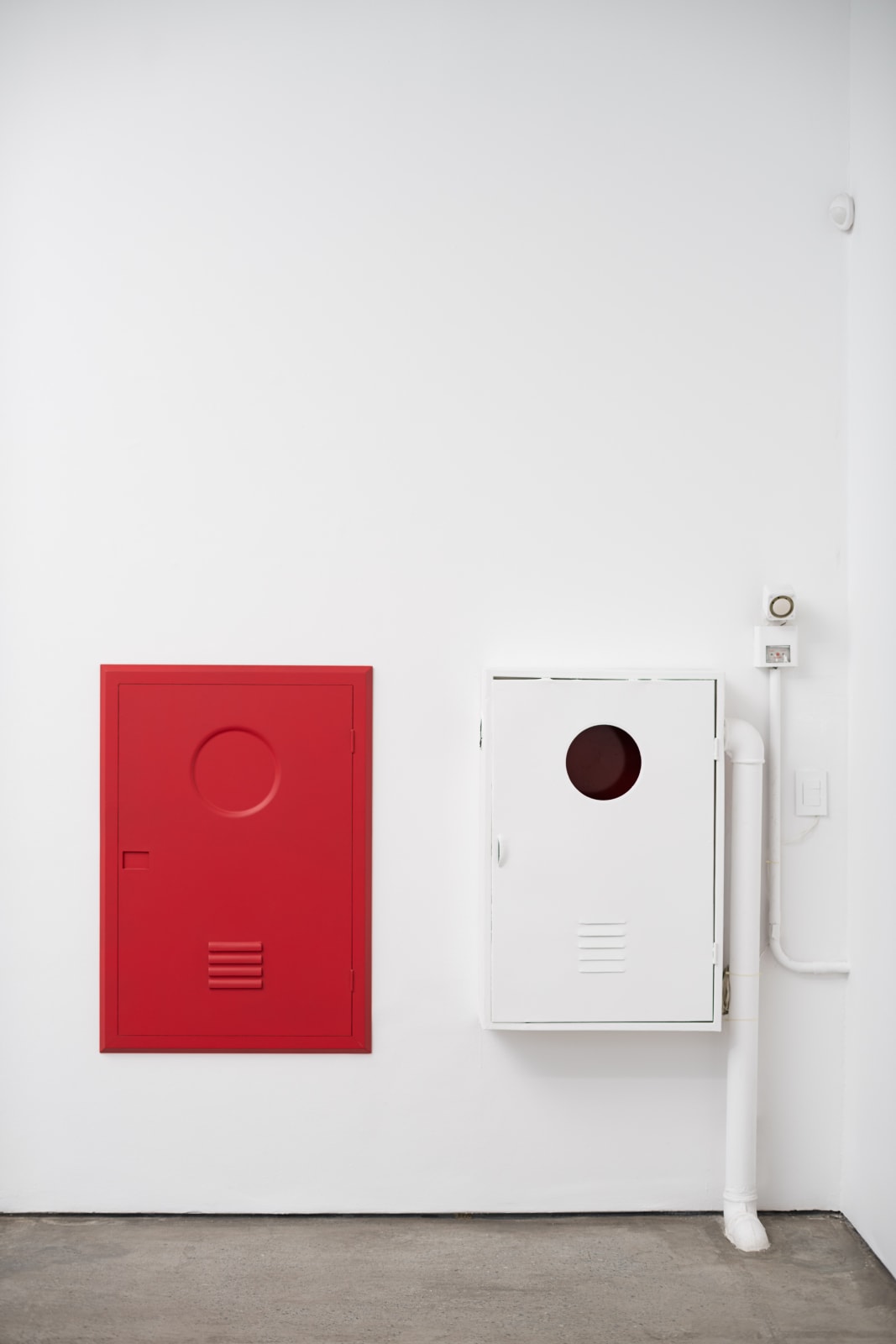
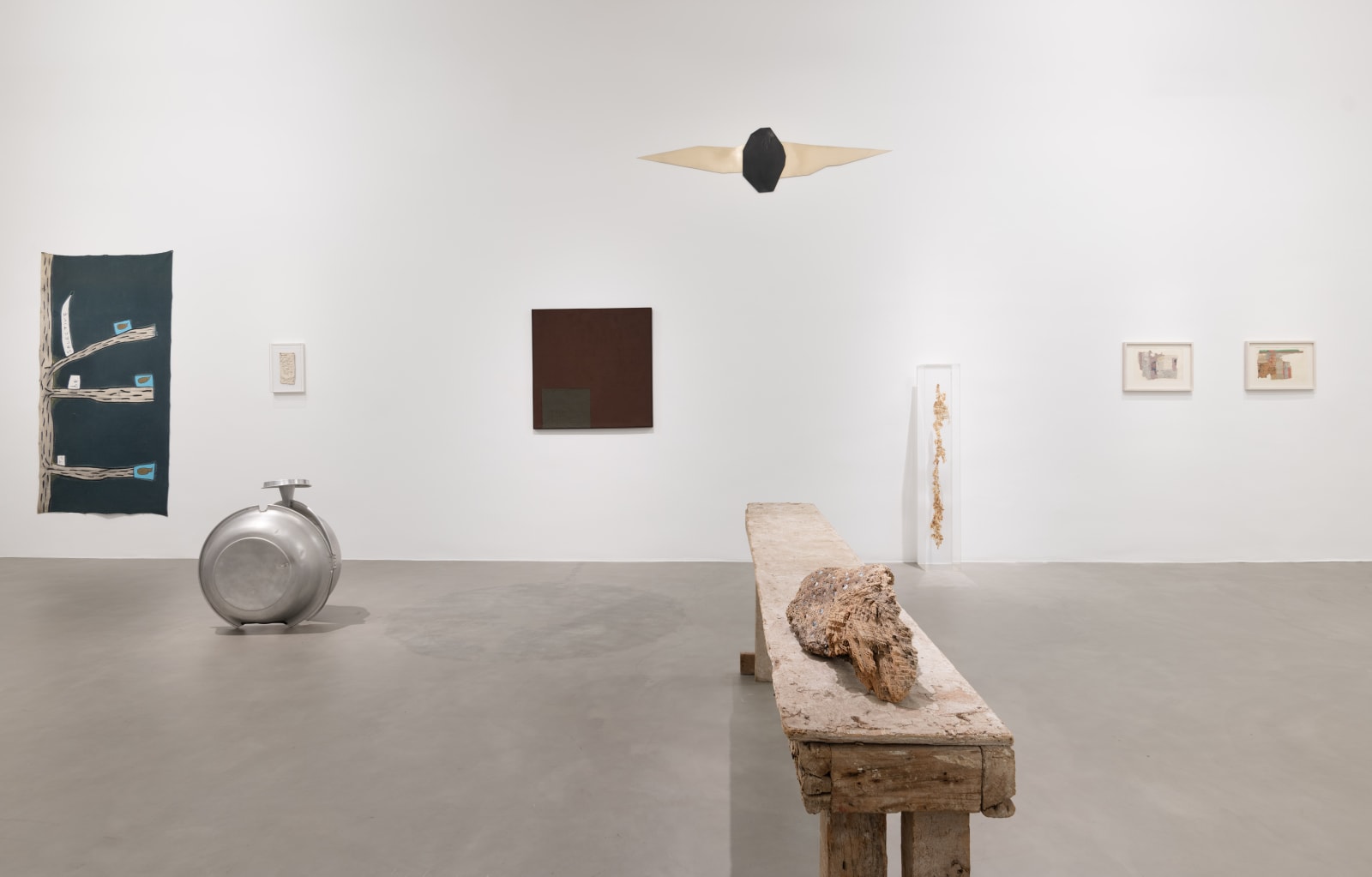
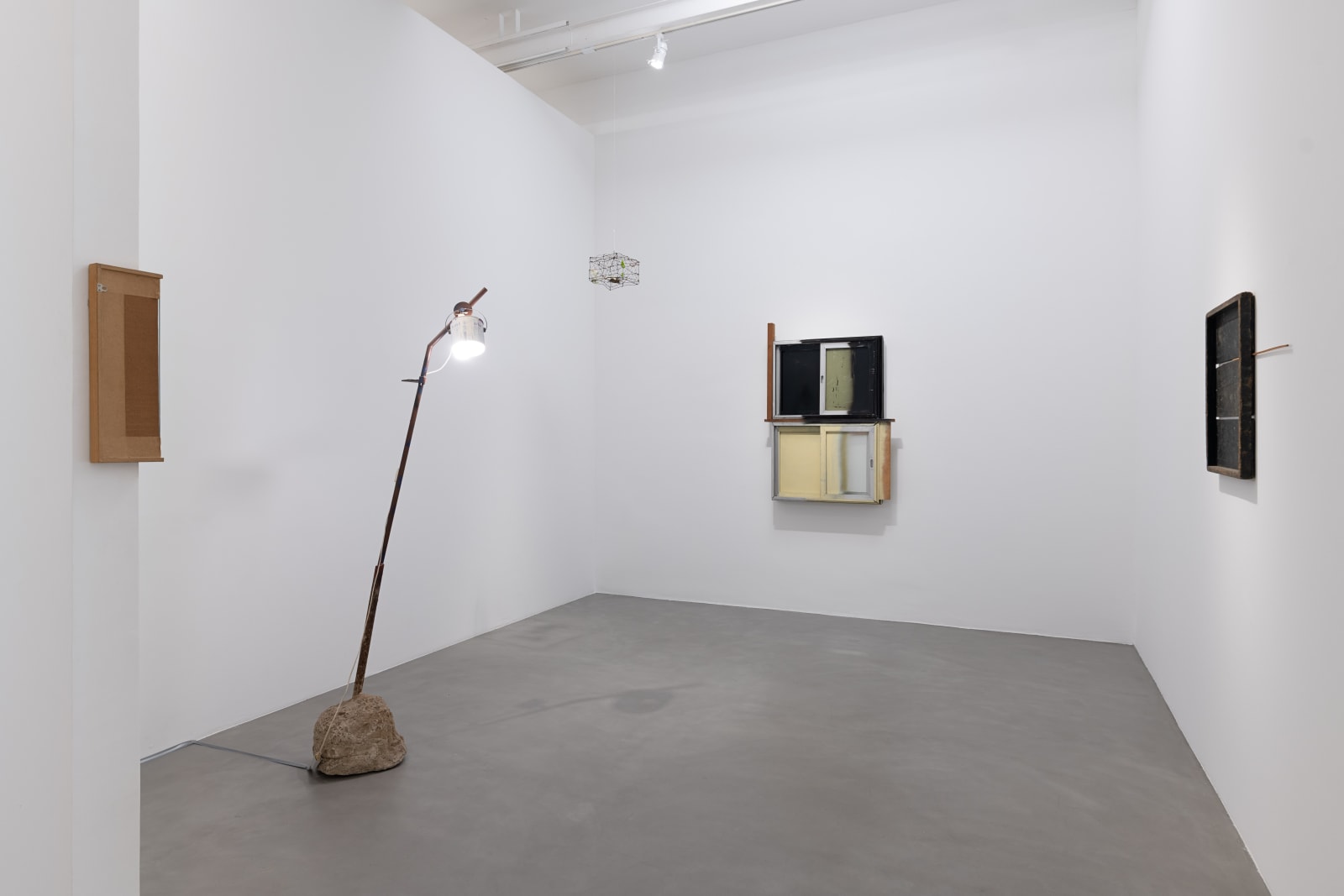
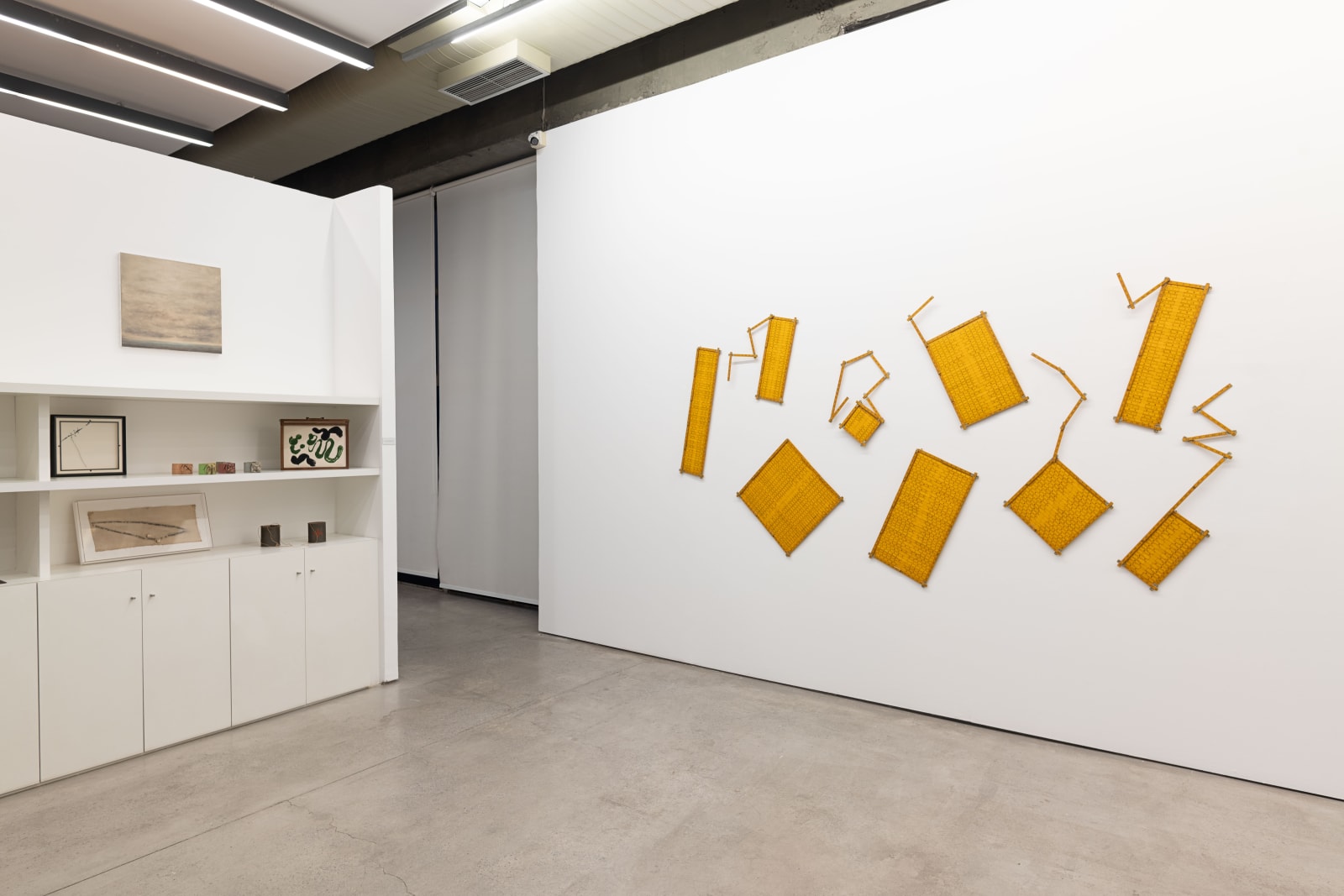
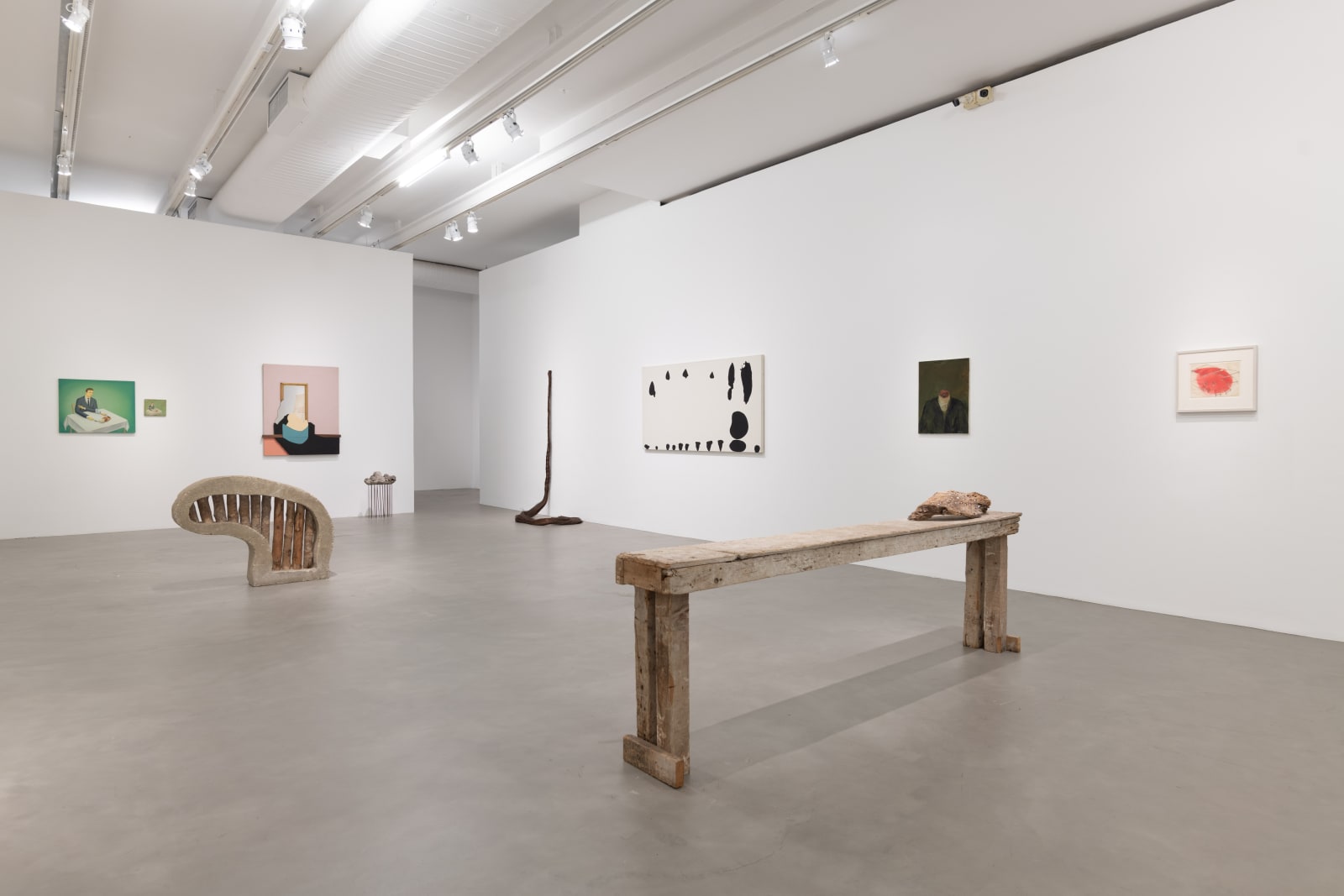
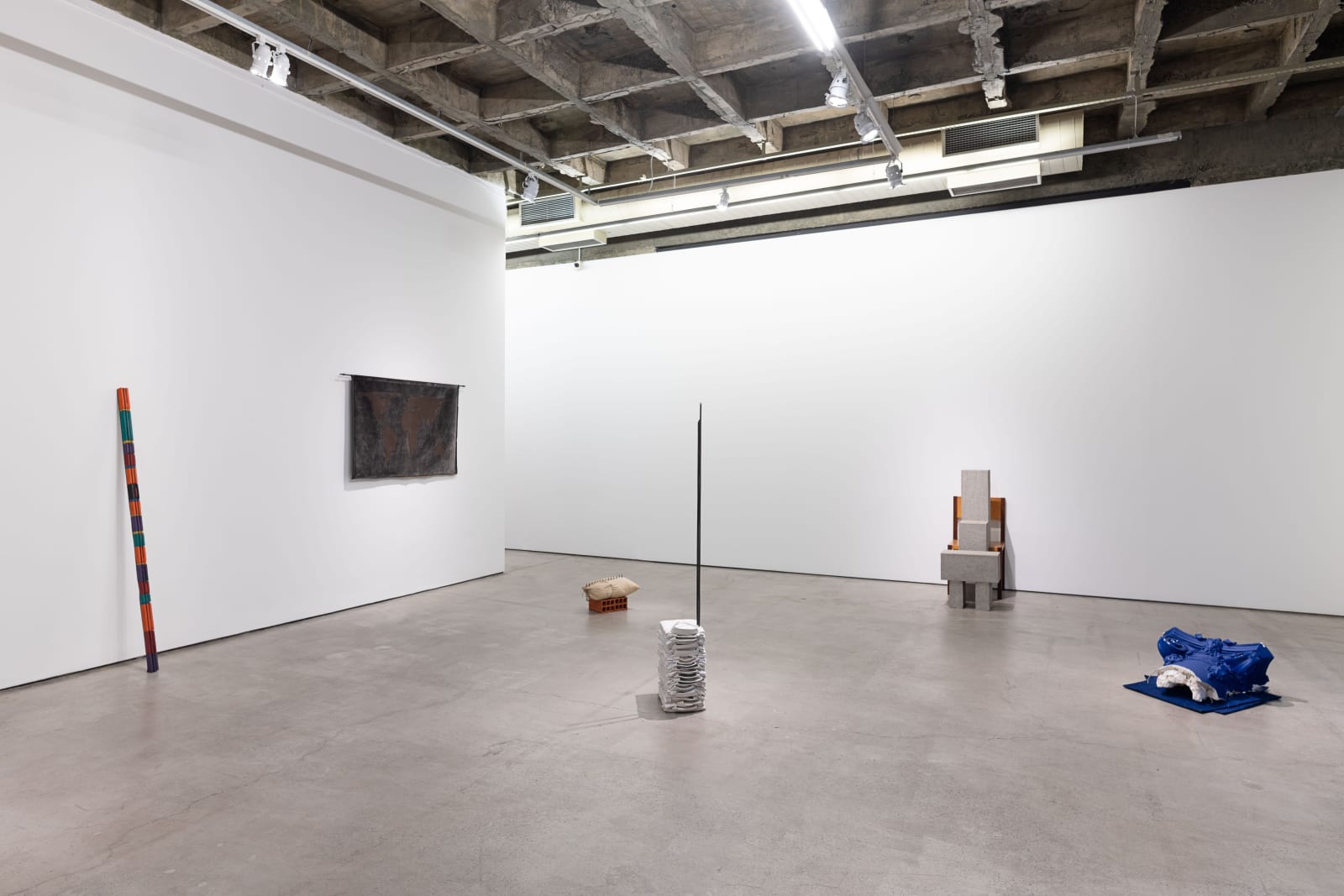
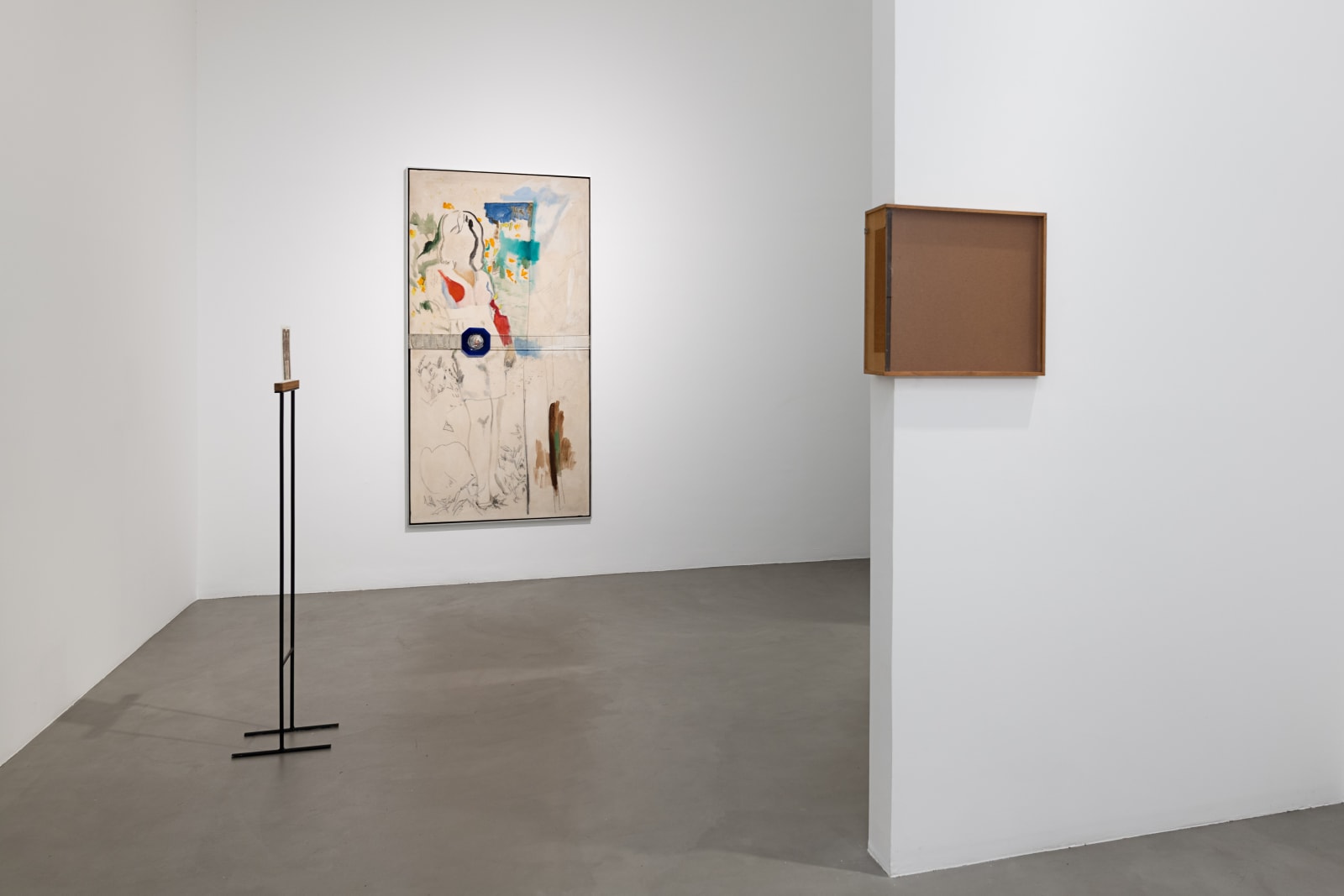
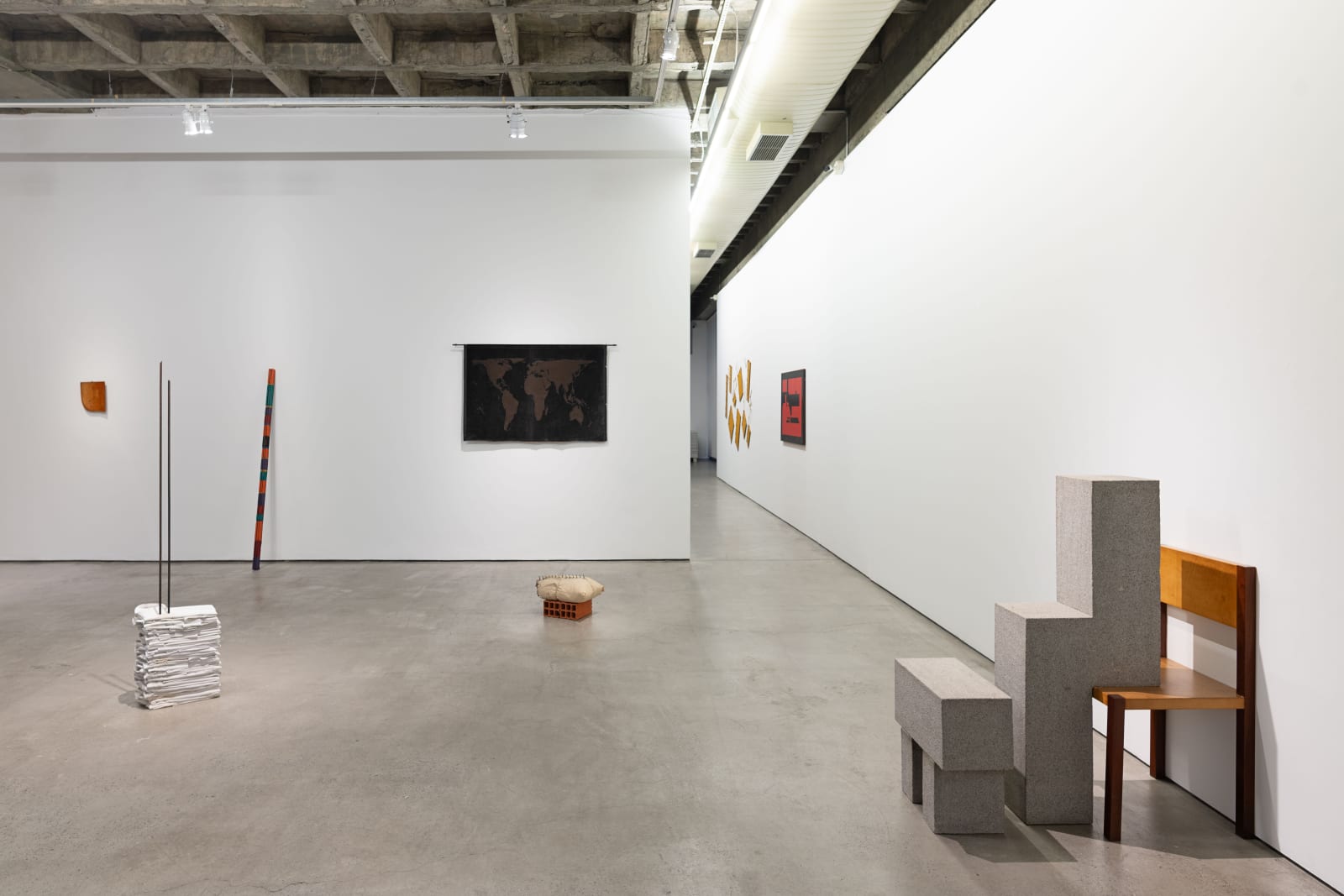
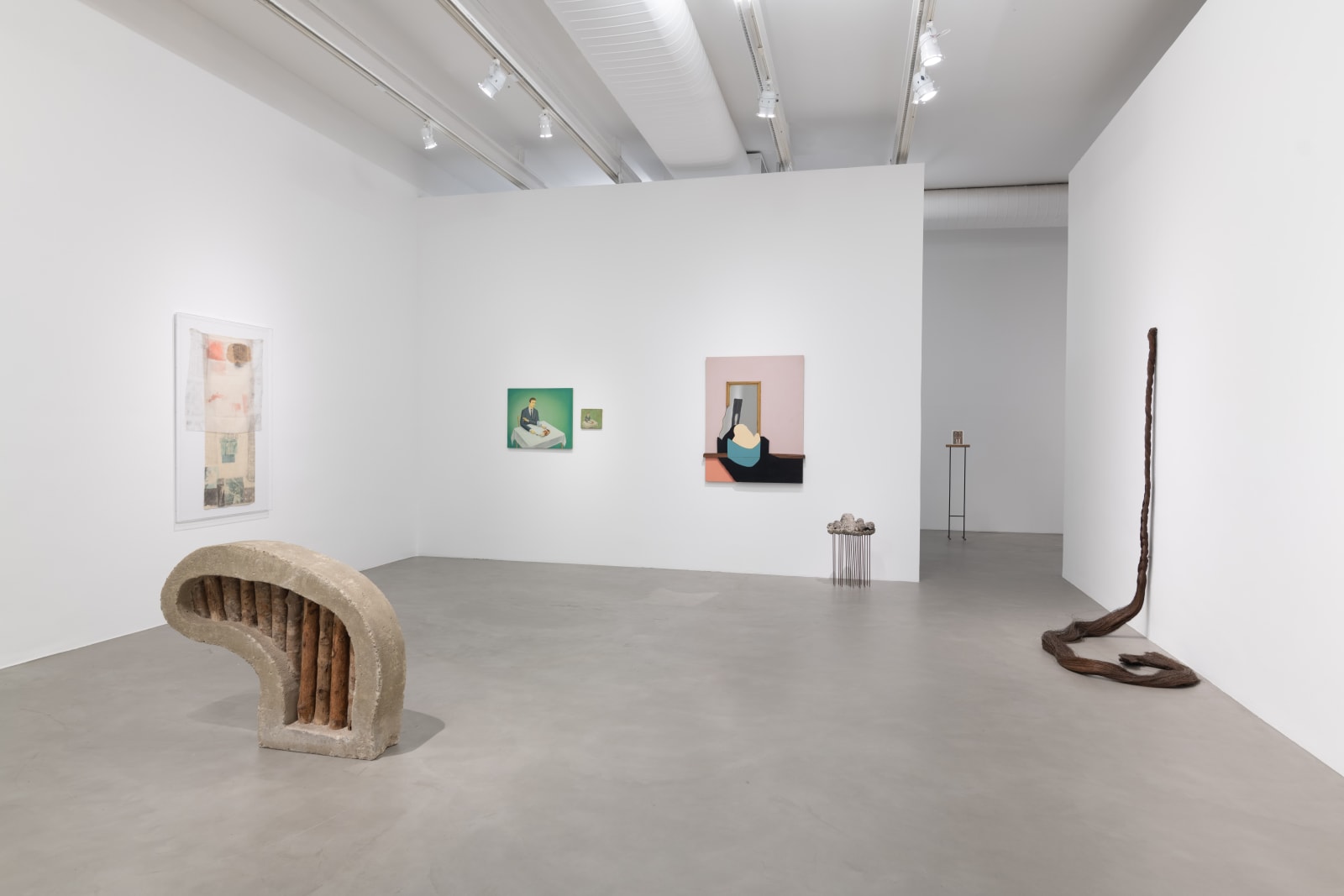
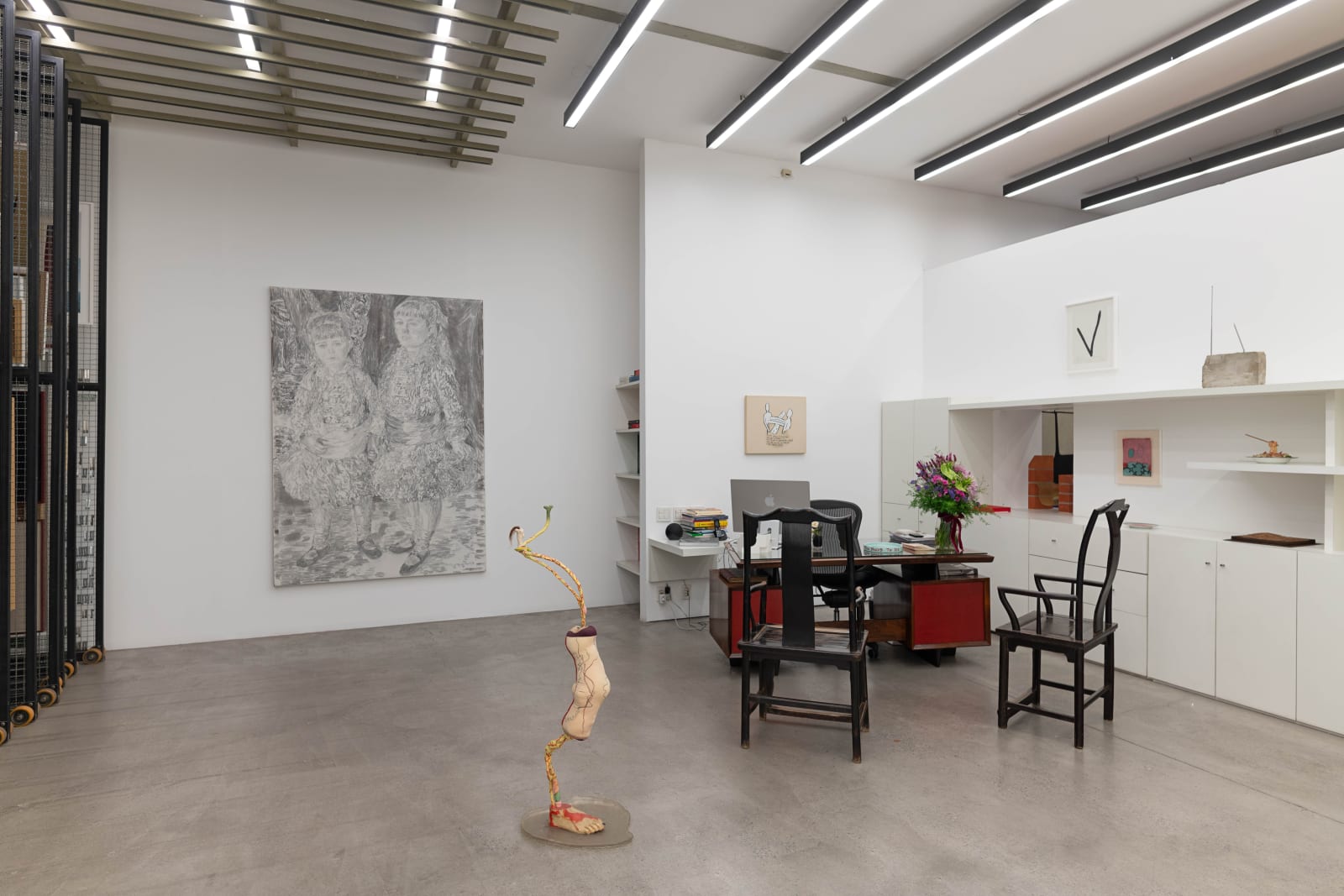
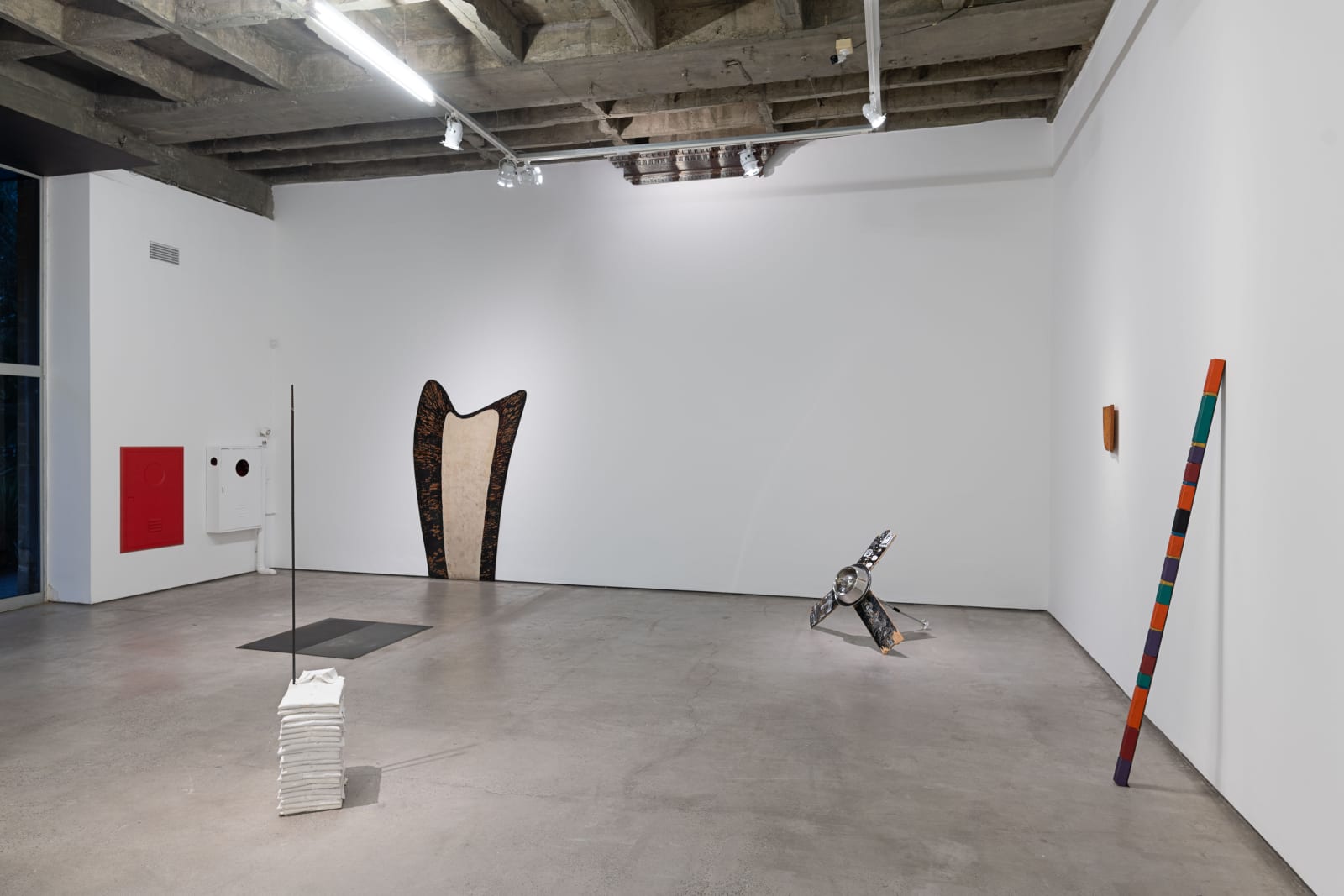
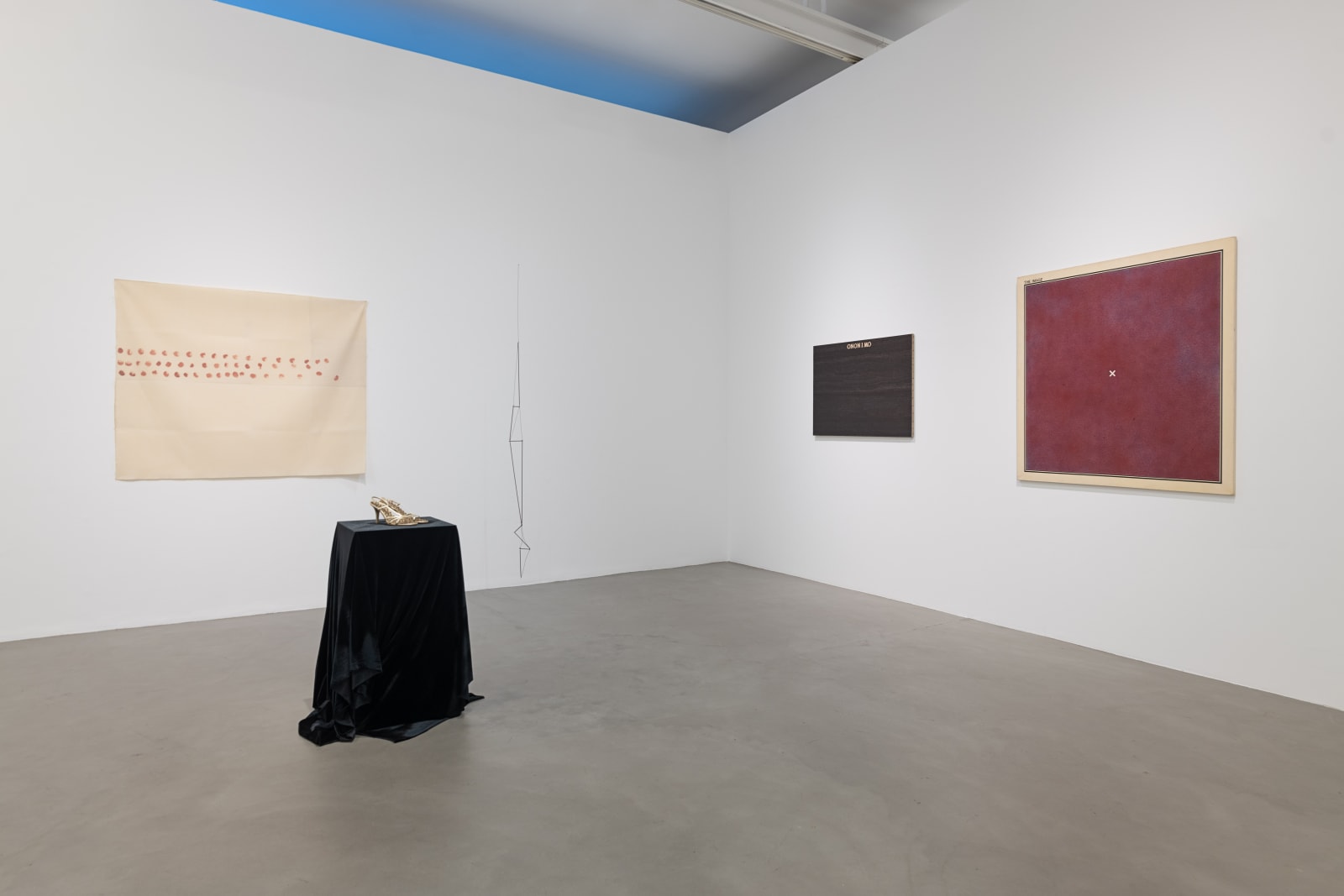
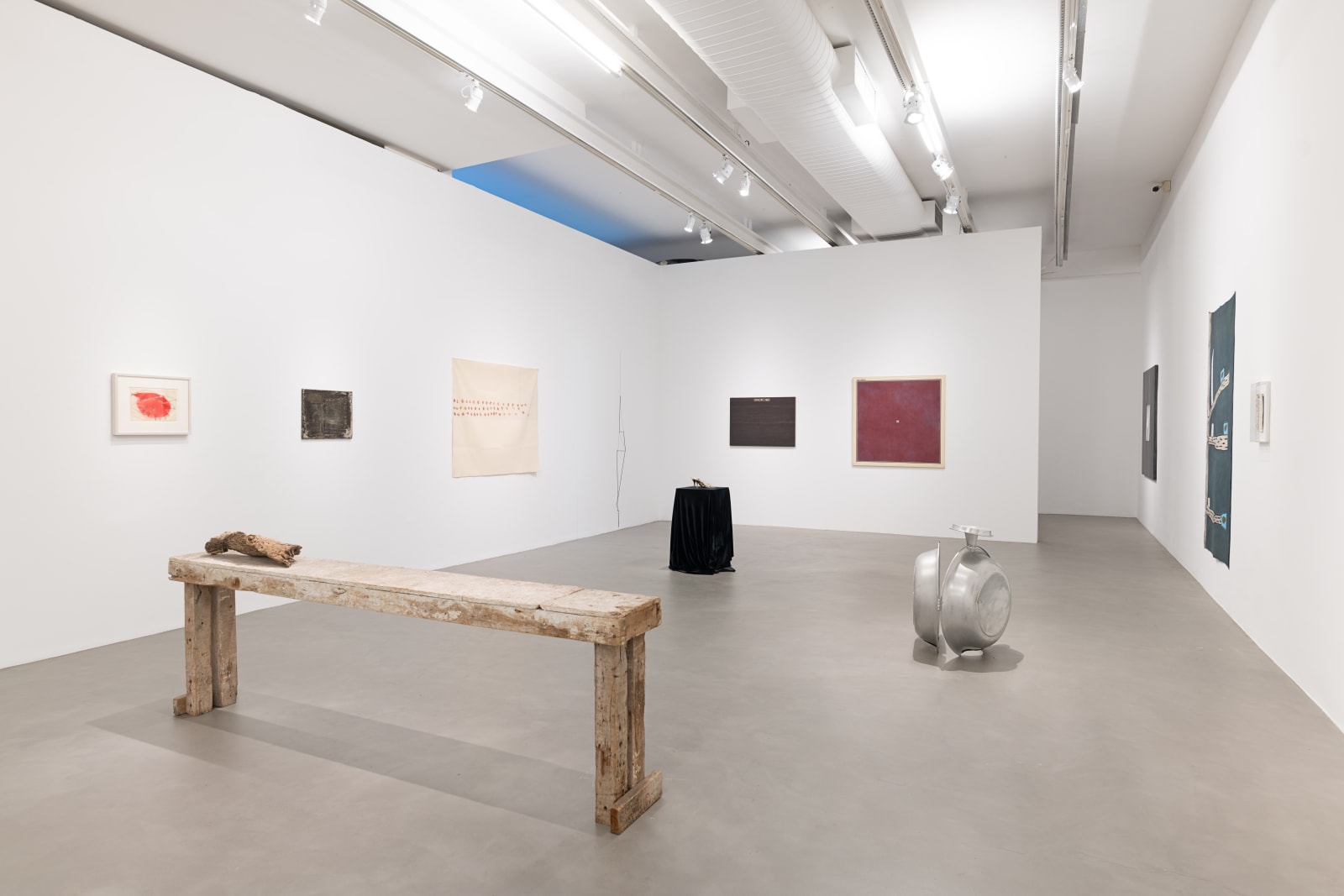
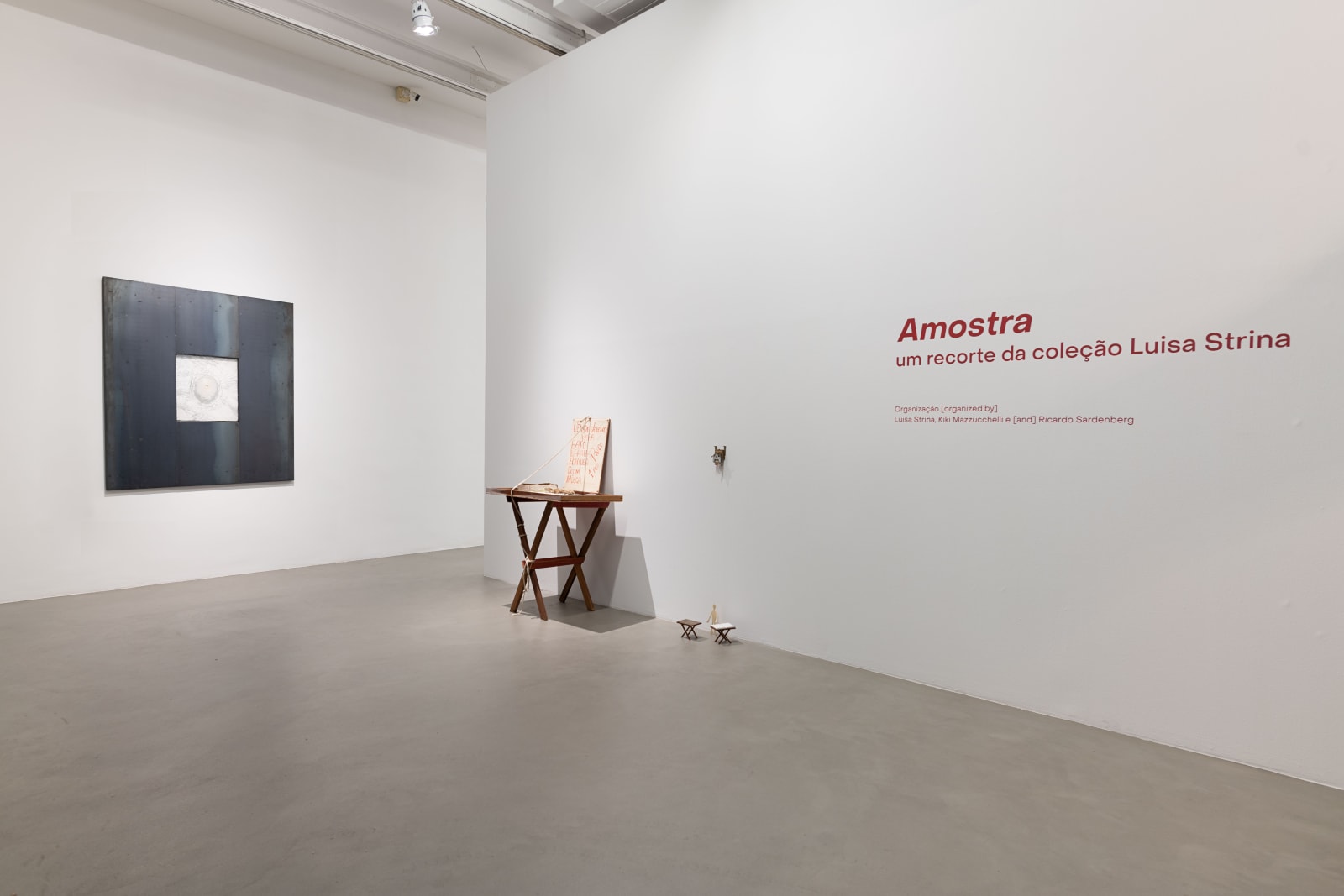
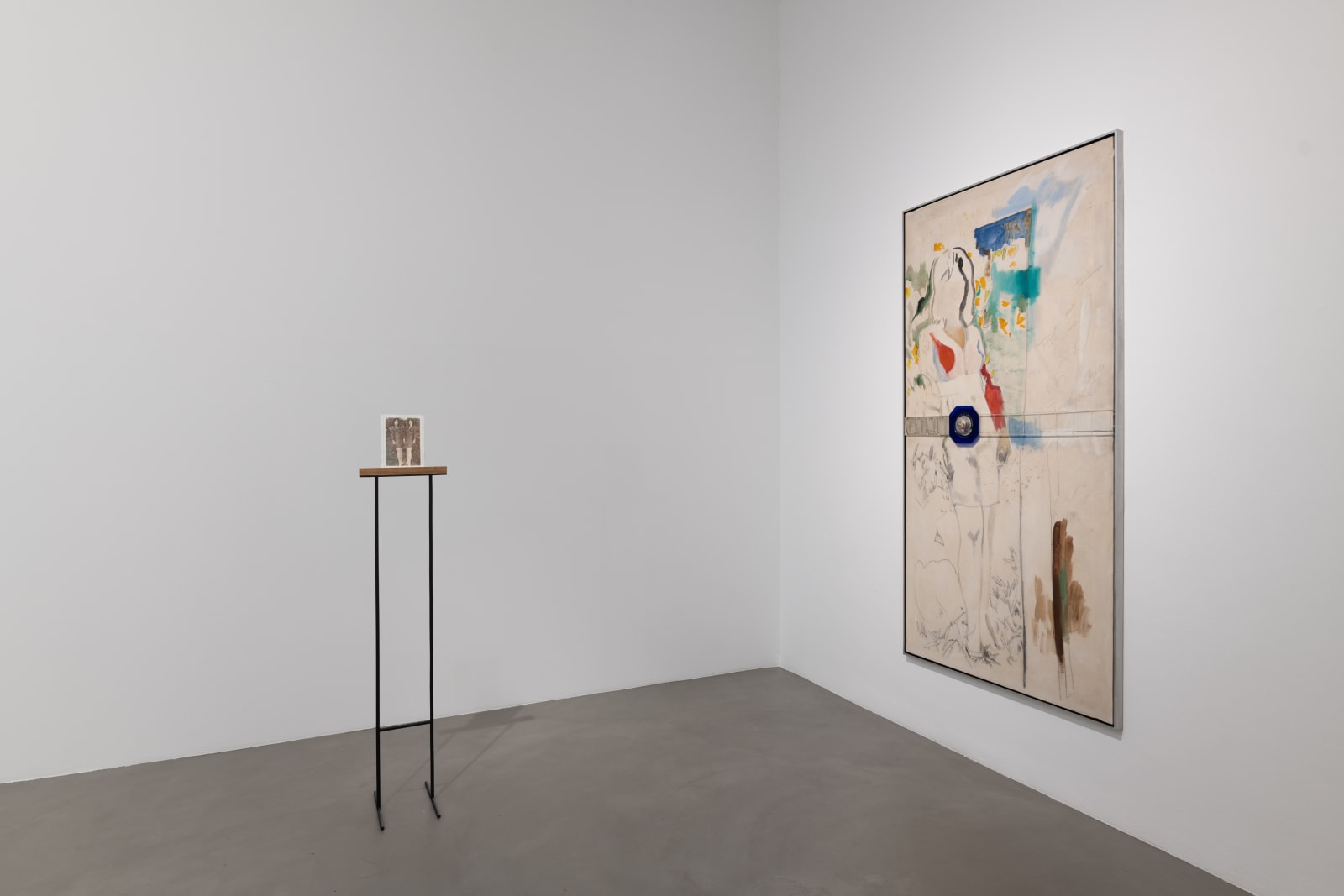
![Juan Araujo Hoje é sempre ontem, 2022 óleo sobre lâmina de zinco [oil on zinc plate] 20 x 15 cm | 7 7/8 x 5 7/8 in Ph: Edouard Fraipont](https://artlogic-res.cloudinary.com/w_600,c_limit,f_auto,fl_lossy,q_auto/ws-galerialuisastrina/usr/exhibitions/images/exhibitions/270/juan_araujo_edouard_fraipont.png)

![Jake and Dinos Chapman Portrait of Luisa Strina, 2006 óleo sobre tela [oil on canvas] 61 x 45.5 cm Ph: Edoaurd Fraipont](https://artlogic-res.cloudinary.com/w_600,c_limit,f_auto,fl_lossy,q_auto/ws-galerialuisastrina/usr/exhibitions/images/exhibitions/270/jake-and-dinos-chapman.png)

![Francis Alÿs Sem título [Untitled], 1993-1994 em colaboração com Emilio Rivera óleo sobre tela [oil on canvas] 62.5 x 72 cm | 20 x 22 cm Ph: Edouard Fraipont](https://artlogic-res.cloudinary.com/w_600,c_limit,f_auto,fl_lossy,q_auto/ws-galerialuisastrina/usr/exhibitions/images/exhibitions/270/screenshot-2024-12-09-at-11.58.26.png)
![Geta Brătescu Vestigii, 1978 colagem têxtil sobre papel [textile collage on paper] 37 x 52 cm Ph: Edouard Fraipont](https://artlogic-res.cloudinary.com/w_600,c_limit,f_auto,fl_lossy,q_auto/ws-galerialuisastrina/usr/exhibitions/images/exhibitions/270/screenshot-2024-12-09-at-11.58.49.png)
![Cildo Meireles A Penteadeira, 1967 madeira pintada, espelho [painted wood, mirror] 122 x 95 x 6 cm Ph: Edouard Fraipont](https://artlogic-res.cloudinary.com/w_600,c_limit,f_auto,fl_lossy,q_auto/ws-galerialuisastrina/usr/exhibitions/images/exhibitions/270/7181.jpg)
![Mike Nelson Cloak of rags (capital/carpet), 2017 gesso, concreto, tijolos, tapetes, pintura azul ultramarina [plaster, concrete, bricks, carpets, ultramarine blue paint] 32 x 85 x 65 cm Ph: Edouard Fraipont](https://artlogic-res.cloudinary.com/w_600,c_limit,f_auto,fl_lossy,q_auto/ws-galerialuisastrina/usr/exhibitions/images/exhibitions/270/mike_nelson1-edouardfraipont27112024artlogic.jpg)
![Marepe Banca de Veneno, 1996 madeira, ratos e baratas, pacotes de veneno [wood, rats and cockroaches, poison packets] 130 x 81 x 51 cm Ph: Edouard Fraipont](https://artlogic-res.cloudinary.com/w_600,c_limit,f_auto,fl_lossy,q_auto/ws-galerialuisastrina/usr/exhibitions/images/exhibitions/270/1473d.jpg)
![Edgard de Souza Sem Título, 1986 concreto e ferro [concrete and iron] 66 x 46 x 31 cm Ph: Edouard Fraipont](https://artlogic-res.cloudinary.com/w_600,c_limit,f_auto,fl_lossy,q_auto/ws-galerialuisastrina/usr/exhibitions/images/exhibitions/270/edgard_de_souza2-edouardfraipont27112024.jpg)
![Ivens Machado Sem título {Untitled], 1990 concreto armado e madeira [reinforced concrete and wood] 88 x 107 x 20 cm Ph: Edouard Fraipont](https://artlogic-res.cloudinary.com/w_600,c_limit,f_auto,fl_lossy,q_auto/ws-galerialuisastrina/usr/exhibitions/images/exhibitions/270/ivens_machado5-edouardfraipont27112024mid.jpg)
![Caetano de Almeida Rosa e Azul, 1999 carvão sobre tela [charcoal on canvas] 230 x 116 cm Ph: Edouard Fraipont](https://artlogic-res.cloudinary.com/w_600,c_limit,f_auto,fl_lossy,q_auto/ws-galerialuisastrina/usr/exhibitions/images/exhibitions/270/caetano_de_almeida2-edouardfraipont27112024mid.jpg)
![Cildo Meireles Parla, 1982 granito , madeira, e couro [granite, wood, and leather] 125 x 50.2 x 110 cm Ph: Edouard Fraipont](https://artlogic-res.cloudinary.com/w_600,c_limit,f_auto,fl_lossy,q_auto/ws-galerialuisastrina/usr/exhibitions/images/exhibitions/270/cildo_meireles1-edouardfraipont16122024mid.jpg)
![Tunga Trança, 1995 fios de cobre [copper wire] 430 x 9 x 9 cm Ph: Edouard Fraipont](https://artlogic-res.cloudinary.com/w_600,c_limit,f_auto,fl_lossy,q_auto/ws-galerialuisastrina/usr/exhibitions/images/exhibitions/270/tunga1-edouardfraipont16122024mid.jpg)
![Wanda Pimentel Furadeira, Da série Envolvimento, 1975 acrílica sobre tela [acrilyc on canvas] 89 x 130 cm Ph: Edouard Fraipont](https://artlogic-res.cloudinary.com/w_600,c_limit,f_auto,fl_lossy,q_auto/ws-galerialuisastrina/usr/exhibitions/images/exhibitions/270/wanda_pimentel1-edouardfraipont16122024mid.jpg)
![Mark Dion Rescue Archaeology, 2000 -2004 cornija coletada do MoMA [cornice collected from MoMA] 33 x 23 x 193 cm Ph: Edouard Fraipont](https://artlogic-res.cloudinary.com/w_600,c_limit,f_auto,fl_lossy,q_auto/ws-galerialuisastrina/usr/exhibitions/images/exhibitions/270/mark_dion1-edouardfraipont16122024artlogic.jpg)
![Pae White Ein Schmuckstück, 2004 papel, arame, cera de abelha [paper, wire, beeswax] 17 x 23 x 23 cm Ph: Edouard Fraipont](https://artlogic-res.cloudinary.com/w_600,c_limit,f_auto,fl_lossy,q_auto/ws-galerialuisastrina/usr/exhibitions/images/exhibitions/270/pae_white1-edouardfraipont16122024artlogic.jpg)
![Jorge Macchi 50 centímetros, 2005 régua de madeira e linha de algodão [wooden ruler and cotton thread] 170 x 60 cm 66 7/8 x 23 5/8 in Ph: Edouard Fraipont](https://artlogic-res.cloudinary.com/w_600,c_limit,f_auto,fl_lossy,q_auto/ws-galerialuisastrina/usr/exhibitions/images/exhibitions/270/jorge_macchi1-edouardfraipont16122024artlogic.jpg)
![Mario Merz Sem titulo [Untitled], 1970 tinta em papel vegetal [ink on tracing paper] 48 x 4 x 40 cm 18 7/8 x 1 5/8 x 15 3/4 in Ph: Edouard Fraipont](https://artlogic-res.cloudinary.com/w_600,c_limit,f_auto,fl_lossy,q_auto/ws-galerialuisastrina/usr/exhibitions/images/exhibitions/270/mario_merz1-edouardfraipont16122024artlogic.jpg)
![Leonilson To be selective, 1990 tinta acrílica, tinta metálica e lápis de cor sobre lona sem chassi [acrylic paint, metallic paint and colored pencil on unstretched canvas] 203 x 105 cm 79 7/8 x 41 3/8 in Ph: Edouard Fraipont](https://artlogic-res.cloudinary.com/w_600,c_limit,f_auto,fl_lossy,q_auto/ws-galerialuisastrina/usr/exhibitions/images/exhibitions/270/leonilson-1-edouard_fraipont_web.jpg)
















